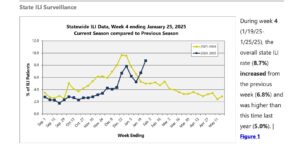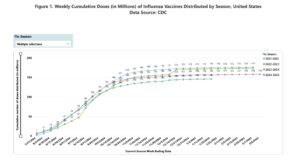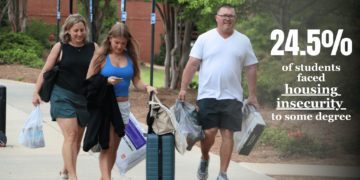The flu has begun to spread quickly among the student body at the University of Mississippi.
“Out of the 12 hour shifts that we work, we’re seeing an influx of patients right now … about 130 a day. I would say about half of those have the flu or flu-like symptoms,” Holly Armstrong, a nurse practitioner at Oxford Urgent Care, said.
The spike in sickness is in line with the rest of the state. A recent report from the Mississippi State Department of Health shows a 5% increase in positive flu cases compared to the same time in 2024.

Alex Langhart, director of University Health Services, has also noticed the rise in flu, RSV and norovirus cases on campus, according to a university press release.
Jakota White, a senior integrated marketing communications major from Gulfport, Miss., is among the students who contracted the flu within the first two weeks of being back at school for the spring term.
After presenting typical symptoms of the flu, White visited the university’s Student Health Center.
“I knew I was going to test positive, but it still wasn’t fun hearing those words,” White said. “I immediately went to the pharmacy and got my prescription before going home to rest. It sucked missing out on everything I had planned for a whole week, but I definitely felt way too bad to do any of it.”
Joe Dikun, an instructional assistant professor in the UM School of Pharmacy, recommended that the best way to fight the flu, especially for college students, is by receiving the flu vaccination around late September or early October in order to be protected when flu season peaks in late December.
“I’d say it’s really critical to get vaccinated. You’re in a high risk environment because of how dense the population is,” Dikun said. “You’re in dorms, you’re in classrooms, you’re in dining halls, in our social gatherings — everybody is in tight quarters, so transmission of these things are more likely,”
However, Dikun said that there are many difficulties that come with encouraging people to get vaccinated, including the spread of misinformation and mistrust in vaccines, along with the usual fear of needles and shots.

Recent data from the Centers for Disease Control and Prevention shows that vaccination rates for the 2024-25 season are lower than the last three seasons.
In addition to the challenge of encouraging students to get vaccinated, there is the challenge of treating them once they do test positive for the virus.
“We are seeing a lot of people which means the wait times are longer which means the waiting room is full. There’s just a bottleneck of patients everywhere,” Armstrong said. “And taking care of college students when they’re not with their parents, it’s hard. It takes up time with us talking on the phone to parents when they’re worried. We do a lot of teaching because they just don’t know what to do.”
Armstrong recommended lots of rest for those afflicted with the flu.
“Don’t go to class, don’t go to the basketball game … rest, hydrate,” Armstrong said. “If you’re exhausted and malnourished, you can’t fight anything. A lot of people get scared that they’re going to miss something, but if you truly don’t feel well you shouldn’t be out and about.”
While the flu continues to spread, students will continue to carry on with the semester in hopes that they do not come down with the sickness.
“I’m glad that I feel better now, but it was rough for a while, especially knowing that I was going to have to make up assignments for classes that I missed,” White said. “I definitely wouldn’t wish that on anybody.”


























